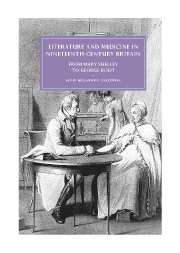At first blush, Charles Darwin may not seem to have much to do with Romantic medicine, or with the narrative and interpretive practices I have been discussing. But in fact, Darwin's thought arises directly out of Romantic medicine, embodying the fullest and, paradoxically, the final expression of Romantic materialism.
Charles Darwin came from a medical family. His grandfather Erasmus Darwin was a renowned physician, as well as a poet. Historian Desmond King-Hele writes,
Patients came to [Erasmus Darwin] from far and wide, and the stories about his almost magical powers became part of Midland folk-lore. King George III wanted Darwin to be his physician, and would no doubt have been better treated during his spells of mental derangement if he had been under Darwin's care: but Darwin would not move south.
Following in his father's footsteps, Erasmus Darwin's son Robert also became a physician of legendary skill, amassing a large fortune from his practice and achieving a high status in the town of Shrewsbury.
Robert's second son Charles – that is, the Charles Darwin who wrote The Origin of Species – was from birth destined for medicine as well. He was named after his uncle, who, as a promising young medical student, cut his finger during the dissection of a cadaver and died of the ensuing infection. Young Charles was initially eager to take up the family profession.
